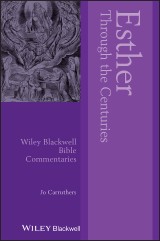Details

Esther Through the Centuries
Wiley Blackwell Bible Commentaries 1. Aufl.
|
31,99 € |
|
| Verlag: | Wiley-Blackwell |
| Format: | EPUB |
| Veröffentl.: | 09.09.2020 |
| ISBN/EAN: | 9781118714041 |
| Sprache: | englisch |
| Anzahl Seiten: | 320 |
DRM-geschütztes eBook, Sie benötigen z.B. Adobe Digital Editions und eine Adobe ID zum Lesen.
Beschreibungen
This interdisciplinary commentary ranges from early midrashic interpretation to contemporary rewritings introducing interpretations of the only biblical book not to mention God. <br /> <ul> <li>Unearths a wealth of neglected rewritings inspired by the story’s relevance to themes of nationhood, rebellion, providence, revenge, female heroism, Jewish identity, exile, genocide and ‘multiculturalism’</li> <li>Reveals the various struggles and strategies used by religious commentators to make sense of this only biblical book that does not mention God</li> <li>Asks why Esther is underestimated by contemporary feminist scholars despite a long history of subversive rewritings</li> <li>Compares the most influential Jewish and Christian interpretations and interpreters</li> <li>Includes an introduction to the book’s myriad representations in literature, music, and art</li> <li>Published in the reception-history series, <i>Blackwell Bible Commentaries</i></li> </ul>
<p>List of Plates xi</p> <p>Series Editors’ Preface xiii</p> <p>Acknowledgements xv</p> <p><b>Introduction 1</b></p> <p>Why Reception? 2</p> <p>An Irredeemable Book? 7</p> <p>Jewish Tradition 10</p> <p>Christian Tradition 12</p> <p>Summary of Works 13</p> <p>Godless Scripture 21</p> <p>Allegory 28</p> <p>Providence, Chosenness, Nationhood 32</p> <p>Political Application 46</p> <p>Esther as Literature 49</p> <p><b>Esther 1:1–9 52</b></p> <p>1:1 The King and Empire 53</p> <p>1:3 The King’s Feast 57</p> <p>1:4 Display of Wealth 58</p> <p>1:8 No Compulsion to Drink 59</p> <p>1:9 Women’s Feast 60</p> <p>Vashti 61</p> <p><b>Esther 1:10–22 68</b></p> <p>1:12 Disobedience 68</p> <p>1:13–22 The Empire Strikes Back 83</p> <p>1:19 Vashti’s Punishment 88</p> <p>1:22 The Decree 89</p> <p><b>Esther 2:1–7 93</b></p> <p>2:1 The King Remembers Vashti 93</p> <p>2:2–4 To the Harem 95</p> <p>2:5–6 Mordecai 98</p> <p>2:7 Hadassah- Esther 103</p> <p><b>Esther 2:8–23 109</b></p> <p>2:8–14 Esther in the Harem 109</p> <p>2:15 Esther’s Beauty 121</p> <p>2:16–18 Esther Becomes Queen 125</p> <p><b>Esther 3 133</b></p> <p>3:1 Haman 134</p> <p>3:2 ‘But Mordecai did not bow down’ 139</p> <p>3:7 Casting Lots 143</p> <p>3:8 (Mis)Representing Jews: A People Set Apart 145</p> <p>3:8 Evil Counsellors 151</p> <p>3:12–15 Genocidal Edicts 155</p> <p>3:15 ‘The King and Haman sat down to drink’ 157</p> <p><b>Esther 4:1–14 160</b></p> <p>4:1–3 ‘Great mourning among the Jews’ 160</p> <p>4:4–14 Esther and Mordecai Confer 163</p> <p>4:14 ‘From another quarter’ 174</p> <p><b>Esther 4:15–17 176</b></p> <p>4:15 ‘Fast ye for me’ 176</p> <p>4:16 ‘If I perish, I perish’ 180</p> <p>Esther as Exemplar of Resolve 184</p> <p>4:17 ‘Mordecai [. . .] did everything as Esther had ordered him’ 191</p> <p><b>Esther 5 192</b></p> <p>Esther before Ahasuerus 192</p> <p>5:4–8 Esther’s First Banquet 215</p> <p>5:9–14 Haman’s Wrath 218</p> <p><b>Esther 6 221</b></p> <p>The King’s Sleeplessness 222</p> <p>6:11 The Triumph of Mordecai 227</p> <p><b>Esther 7 and 8 233</b></p> <p>7:1–6 Esther’s Second Banquet 233</p> <p>7:7–8 Haman’s Fate 238</p> <p>8:1–6 ‘How can I endure to see the destruction of my kindred?’ 244</p> <p>8:7–14 The Irreversible Decree 244</p> <p>8:15–17 ‘The Jews had light, and gladness, and joy, and honour’ 249</p> <p><b>Esther 9 and 10 254</b></p> <p>9:2 Scenes of Slaughter 256</p> <p>9:7–10 Ten Sons of Haman 265</p> <p>9:26 Purim 267</p> <p>9:29 & 32 ‘Then Esther the Queen . . . wrote with all authority’ 275</p> <p>10 The Greatness of Mordecai 277</p> <p><b>Bibliography 280</b></p> <p><b>Primary Sources</b></p> <p>Pre- 1500 280</p> <p>1500–1800 281</p> <p>Post- 1800 284</p> <p>Esther Secondary Sources 289</p> <p>Other Secondary Sources 293</p> <p>Index 296</p>
"The author digs up literary echoes and poetic versions of the biblical book of Esther.... This important scholarly resource originated as a PhD thesis in the University of Manchester. It is to be hoped the PhD students can be interested in doing similar research, producing studies as valuable as the present one." (<i>International Review of Biblical Studies</i>, 2007-2008) <p>"This book can be highly recommended. It provides a fascinating glimpse of how the Bible has shaped … The ideals of society throughout history." (<i>Expository Times</i>, November 2008)</p> <p>"Carruthers looks at the reception of the text in detail, but also has an introduction to different ways of viewing the biblical book." (<i>Church Times</i>, October 2008)</p>
<p><b>Jo Carruthers</b> teaches at Lancaster University, UK, and works across the disciplines of literary and religious studies. Her books include <i>The Politics of Purim: Law, Sovereignty and Hospitality in the Aesthetic Afterlives of Esther</i> (2020);<i> England's Secular Scripture: Islamophobia and the Protestant Aesthetic</i> (2011); and<i> Literature and the Bible: A Reader</i> (with Mark Knight and Andrew Tate, 2013).
<p><i>Esther Through the Centurie</i>s traces Jewish, Christian and secular reception of the only biblical book not to mention God. Author Jo Carruthers introduces the most significant adaptations of this story of Jewish life in the Persian Empire; a tale about averted genocide, a heroic queen and the machinations of court politics. Prominent in the Jewish tradition because of the festival of Purim, Esther has also provoked and inspired Christian and secular writers, artists, musicians and commentators for two millennia. <p>This commentary unearths a wealth of neglected rewritings inspired by the story's engagement with themes of nationhood, rebellion, providence, revenge, female heroism, Jewish identity, exile and genocide. Ranging from early rabbinic interpretation to contemporary rewritings, the book discusses the significance of Esther for artists such as George Eliot, Nathaniel Hawthorne, Handel and Michelangelo, who are drawn to the cosmic drama of good versus evil and its authoritative yet transgressive queen. The book examines Esther chapter by chapter, revealing a surprising afterlife remarkably resonant with contemporary preoccupations. <p><i>Esther Through the Centuries</i> is published within the Wiley Blackwell Bible Commentaries series. Further information about this innovative reception history series is available at <b>www.bbibcomm.info.</b>


















